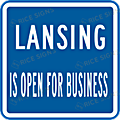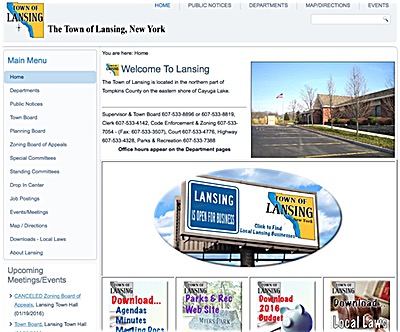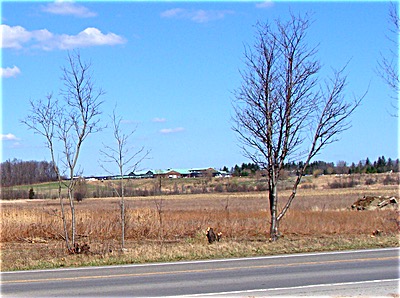- By Dan Veaner
- News
 Print
Print  Supervisor Ed LaVigne says he wants to make supporting local businesses and attracting new ones to Lansing a top priority. The first manifestation of this initiative is part of a re-thinking of the Town Web Site that now prominently displays the slogan, 'Lansing is Open For Business'. Click on the billboard and you see the beginning of a Lansing business directory that LaVigne hopes will list the logos of all the businesses in the Town and Village of Lansing with links to their Web sites. To participate a local business simply provides a graphic in a particular size and format, plus their Web site address.
Supervisor Ed LaVigne says he wants to make supporting local businesses and attracting new ones to Lansing a top priority. The first manifestation of this initiative is part of a re-thinking of the Town Web Site that now prominently displays the slogan, 'Lansing is Open For Business'. Click on the billboard and you see the beginning of a Lansing business directory that LaVigne hopes will list the logos of all the businesses in the Town and Village of Lansing with links to their Web sites. To participate a local business simply provides a graphic in a particular size and format, plus their Web site address."It looks like a billboard," he says. "You touch or click on it and you see all these different businesses. This is a work in progress. The main thing is to benefit our businesses and benefit our residents who shop in this area. Every once in a while you need to have your information presented to reminder consumers 'we actually can go here' be it restaurants, or any other Lansing business."
 The Town Web site now features local businesses. Only a few are currently listed but Supervisor Ed LaVigne hopes it will grow to include all local businesses in the Town and Village of Lansing. Editor's note: Lansing Star Web Design, owned by the company that owns The Lansing Star Online, maintains the Town Web site.
The Town Web site now features local businesses. Only a few are currently listed but Supervisor Ed LaVigne hopes it will grow to include all local businesses in the Town and Village of Lansing. Editor's note: Lansing Star Web Design, owned by the company that owns The Lansing Star Online, maintains the Town Web site.To begin with the business page shows all businesses randomly, but a component has been added to the Web site that will allow it to organize businesses into categories. LaVigne hopes it will become a comprehensive directory of Lansing businesses. And he says the Town can do more to promote existing businesses. He plans to revive the Town Newsletter that has not been published since 2012. This will be distributed on a quarterly basis, and he plans to include a business card-style directory in it, along the lines of the Lansing Lions Club's pancake breakfast place mats.
"We would like their contact information, because as we put forth our first newsletter we will put that information in there," he says. "As this evolves I suspect it will be listed by categories. And we can have that in our newsletter every three months. I am open to suggestions as to how people want to do that."
While promoting local business and tourism within Lansing is nice for existing businesses, LaVigne has his eye on reducing property taxes. That will mean attracting new business to Lansing. The conventional wisdom is that municipalities spend less providing services to businesses than to residential areas. Attracting new business, therefore, means increasing the tax base with little impact to the cost of providing those services. Succinctly that means more tax revenue and less expenditure. That benefits residents because, in theory, they pay less.
"You can provide your services one of two ways," LaVigne says. "You can either ay for it on the backs of the taxpayers, or you can make the pie bigger. You make the pie bigger by bringing in new businesses and increasing the assessments for that business area. What I'm promoting is you should decrease the tax rate. Now, you can't do anything about assessments, but what you can do is make everybody's slice smaller so there is less of a tax burden on our taxpayers and residents."
Part of this initiative is the revival of the Lansing Economic Development Committee. It will be chaired by Chris Williams, who opposed LaVigne in the Republican primary election last year. The Town is currently looking for members who will both contribute to the ongoing comprehensive plan update initiative and advise the Town Board on strategies for increasing the business presence in Lansing.
In the height of the town center discussions past Economic Development Committee Chairman Andy Sciarabba promoted the idea of a business and light industry park on the north side of the 150 acre property. LaVigne says something like that would be advantageous, noting that that part of the property is very close to the youth incarceration center, which makes it less attractive for residential developers.
"When you look at the Business park on Dutch Mill Road, you have one road and you have massive amounts of businesses there. If you had one or two more Dutch Mills..." he says. "One of the first things I'd like to do in January and February is to reach out to an appraiser. Have an appraisal done to find out what areas of the land are worth, and work with our planner and other individuals to decide what things should be put in the different areas."
 The Town owns about 150 acres of land that may or may not become a town center. At this stage town officials are planning to have the land reappraised before deciding what to do with it.
The Town owns about 150 acres of land that may or may not become a town center. At this stage town officials are planning to have the land reappraised before deciding what to do with it.He says the appraisal will provide the current value of the land, as well as identify the most advantageous locations for residential or business development, as well as farm land and wetland acreage. A part of the property may not be salable because of contamination near the old Highway Department (the building next to Scoops ice cream stand). While it was cleaned up, there is some concern that some kinds of development that would disturb nearby soil might require further cleanup that could be costly to taxpayers because it legally remains the Town's responsibility.
In recent months LaVigne has talked about selling parcels on that property to developers, and to get the Town 'out of the real estate business'. Part of the original vision was that people could live and work in the town center, and eventually shop there as well, reducing the need to drive, and promoting a close-knit sense of community. Sciarabba argued that business and light industry would not have a major impact on the view and the character of the community, but would bring tax dollars to the Town. Part of that vision has also been to preserve pathways and encourage development in a way that makes sense.
"I would ask of developers that we keep in mind the pathways that are there," he says. "This is when you have the conversation about pathways, when development is in the infant stage. if a developer were to buy part of it I would ask them to work with the Pathways people and dedicate a small amount of the land to the paths. When I've talked to developers in the past, they are agreeable to that. I think in the long run, we would get positive results."
If you were to characterize the top two issues LaVigne has stressed as a councilman and in his campaign for Supervisor, they would be a tightly conservative budget and making Lansing more business-friendly.
"Number one, they are taxpayers, also. And number two, they employ people locally. And number three, they produce sales tax, which is critical to our budget. These are all positives that come from them, so how do we enhance them? That is one of the things I am interested in: how do you promote local? How do we promote the whole town, which includes the Village?"
v12i2



